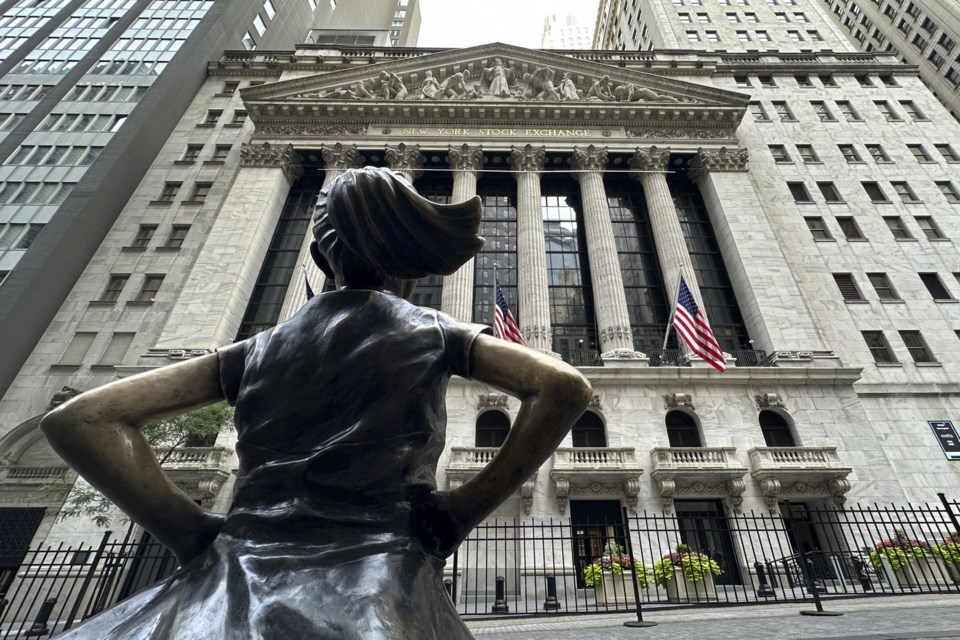Stocks drifted to a mixed close near the all-time highs they set last week. The S&P 500 index edged up 0.2% Wednesday. The Nasdaq composite rose 0.5%, and the Dow Jones Industrial Average edged up less than 0.1%. The majority of stocks in the S&P 500 fell. FedEx helped offset the losses with a gain of 15.5%. The package carrier reported results for its latest quarter that easily beat forecasts. Rivian soared more than 23% after Volkswagen said it would invest up to $5 billion in the struggling maker of electric vehicles.
THIS IS A BREAKING NEWS UPDATE. AP’s earlier story follows below.
Stocks on Wall Street barely budged Wednesday, with the major indexes holding close to the all-time highs they set last week.
The S&P 500 index was mostly unchanged after drifting between small gains and losses in afternoon trading. The Nasdaq composite rose 0.3% and the Dow Jones Industrial Average was up 26 points, or 0.1% as of 3:37 p.m. Eastern.
Roughly 70% of stocks in the S&P 500 were losing ground, but several big stocks helped cushion the fall.
Amazon.com rose 4.1%, surpassing $2 trillion in market value for the first time. The rise in the e-commerce giant's stock market valuation comes a little more than a week after Nvidia hit $3 trillion and briefly became the most valuable company on Wall Street.
Cheerios maker General Mills fell 4.2% after reporting that revenue for its most recent quarter fell more sharply than analysts expected. The company has been dealing with lower sales volumes as consumers grow more cautious and price-conscious amid stubborn inflation.
Chipotle slipped 0.1% on the first day of trading after its 50-for-1 stock split. It was previously among the most expensive stocks in the S&P 500.
FedEx helped offset the losses with a gain of 15%. The package carrier reported results for its latest quarter that easily beat forecasts. Rivian soared 21.5% after Volkswagen said it would invest up to $5 billion in the struggling maker of electric vehicles.
Several big technology companies gained ground and also cushioned the impact from the broader market's decline. Apple rose 1.9% and Microsoft gained 0.2%. Their large values tend to heavily influence the direction of the market.
Wall Street's big focus this week will be on the government's latest inflation report Friday. The personal consumption expenditures index, or PCE, is the Federal Reserve's preferred measure of inflation. Wall Street expects it to show that the rate of inflation eased to 2.6% in May, following a 2.7% reading in April.
The Fed is trying to tame inflation back to its 2% target, but the rate has been sticky. The PCE has been hovering just below 3% for months. The better known consumer price index has been hovering around 3% throughout 2024, though it was as high as 9.1% in the middle of 2022.
The latest updates on inflation could influence the central bank's decision on when to begin cutting interest rates, which remain at their highest level in more than 20 years.
“Noisy inflation data may be sufficient to keep policymakers cautious in their moves, but the global disinflationary process is well established,” said Solita Marcelli and other analysts in a report from UBS. “Easing price pressures and other economic considerations should encourage central banks to start or continue cutting rates.”
In the bond market, Treasury yields were mixed. The yield on the 10-year Treasury rose to 4.32% from 4.25% late Tuesday. It’s been mostly falling since topping 4.70% in late April, which has relaxed the pressure on the stock market.
Investors are hoping that the Federal Reserve will soon begin cutting interest rates. Wall Street is betting on a rate cut at the central bank's September meeting.
The economy has remained relatively strong, despite inflation and high borrowing costs for consumers and businesses. Economic growth has been slowing, though, and consumers are seemingly more stressed and shifting spending to necessities. Wall Street is hoping that Fed can time its rate cuts so that it relieves pressure on the economy before it slows too much, but doesn't also fall short of its goal of cooling inflation.
Damian J. Troise And Alex Veiga, The Associated Press

